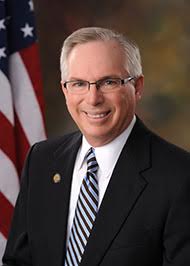The Senate Ways and Means will be hearing testimony this week about Senate Bill 311. This bill takes all money that goes to KSDE to be disbursed to the districts and moves it to the State Department of Administration to be disbursed by the Governor. This includes all funds including federal funds, food service, and all state aid. This would essentially move all of the fiscal responsibility of the School Finance Department that is currently headed by student centered former educators Dale Dennis and Craig Neuenswander to political appointees in the Kansas Department of Administration.
This was hurriedly put in for a hearing through Senator Ty Masterson. He introduced it last year and is now sending it through again. This is another example of “strategic” governance where the strategy is that they hope no one is looking while public schools are weakened further.
SB 311 is a bad idea for a number of reasons:
- The Department of General Administration does not understand school finance as well as KSDE.
- It puts too much control in the hands of the governor and his staff.
- It erodes the authority of the State Board of Education.
- It reduces transparency.
- It increases the chances the Department of Administration could misuse federal funds, putting them in jeopardy.
- It would undoubtedly reduce the level of service and responsiveness to school districts.
- The current deputy commissioner in charge of school finance and his assistant are former educators. This would take decision making away from education professionals and put it in the hands of politically appointed staff members who work for politicians.
The bill is scheduled for a hearing on Thursday in Committee. It is possible that the committee could vote on the bill at that time.
Please call Senate Ways and Means Committee Members before Thursday and ask them to reject SB 311 for the reasons above. Then email the committee members either individually or in one single email. Let them know that this maneuver is NOT in the best interest of Kansas communities, schools and most importantly students!
Also, forward to your friends who are in the cities of these senators and ask them to call too.
Steve Abrams, Arkansas City 785-296-7381 Steve.Abrams@senate.ks.gov
Tom Arpke, Salina, 785-296-7369 Tom.Arpke@senate.ks.gov
Jim Denning, Overland Park, 785-296-7394 Jim.Denning@senate.ks.gov
Steve Fitzgerald, Leavenworth, 785-296-7357 Steve.Fitzgerald@senate.ks.gov
Marci Francisco, Lawrence, 785-296-7364 Marci.Francisco@senate.ks.gov
Dan Kerschen, Garden Plain, 785-296-7353 Dan.Kerschen@senate.ks.gov
Ty Masterson, Andover, 785-296-7388 Ty.Masterson@senate.ks.gov
Jeff Melcher, Leawood, 785-296-7301 Jeff.Melcher@senate.ks.gov
Michael O’Donnell, Wichita, 785-296-7391 Michael.ODonnell@senate.ks.gov
Larry Powell, Garden City, 785-296-7694Larry.Powell@senate.ks.gov
Caryn Tyson, Parker, 785-296-6838 Caryn.Tyson@senate.ks.gov
Laura Kelly, Topeka, 785-296-7365 Laura.Kelly@senate.ks.gov
HINEMAN: Budget troubles already

Rep. Don Hineman
Opinion editorial by Representative Don Hineman, originally published in the Hays Post: http://www.hayspost.com/2016/03/06/hineman-budget-troubles-already/
The Kansas House and Senate agreed on a budget during the week of February 15. That is an extraordinary event because it is likely that the legislature has never before agreed on a budget so early in the session. That accelerated schedule was made possible by the fact that we are now on a biennial budget cycle. The budgets for fiscal years 2016 and 2017 were first adopted during the 2015 session. That means that this year it was only necessary to revise those previous budgets to reflect changing circumstances since that time.
But all is not well with the budget. As passed, the budget only allowed for a year-end cash balance of $6 million… a minuscule amount when one is dealing with an annual state general fund budget of $6.3 billion. At the time I remarked that it appeared the budget was held together with baling wire and duct tape. Unfortunately it seems the baling wire has now broken and the duct tape has lost its grip. Last week we received the unfortunate news that the February revenues to the state were $53 million less than expected. The really troubling part is that disappointing revenue reports are now a recurring event. State revenues have come in below expectations in eleven of the last twelve months.
Some folks have begun to blame the revenue estimating group for missing the mark with their past estimates. I believe that blame is misplaced. The estimating group has had an excellent record in the past of producing on-target revenue estimates. It is only since the tax cut of 2012 that the estimates have begun to diverge significantly from the actual numbers. I believe that tax cut is to blame for the estimates missing the mark in recent months. It represents a dramatic shift away from long-established state tax policy. That makes it very difficult to predict the outcome. When economists attempt to predict economic activity, they are really trying to predict human behavior. The bigger the change in the economic system or tax system, the harder it becomes to accurately predict the response of the people and the economy.
The February report pushed the projected ending balance to a negative $47 million. That is a deficiency which must be corrected, because the state is required to have a positive ending balance at the end of the fiscal year on June 30. Governor Brownback immediately responded by making an allotment (reduction) of $17 million to the appropriation for regents institutions for the current fiscal year. That theoretically makes the projected ending balance a negative $30 million. It is quite likely that Governor Brownback will be forced to use his newly-granted authority to delay up to $100 million of state employer contributions into KPERS.
In retrospect the prudent thing to do, if such a dramatic change in tax policy was contemplated, would have been to initiate that change at a time when state cash reserves were large enough to effectively deal with unexpected shortfalls if things didn’t work out as expected. Instead the abrupt change in tax policy forced the state to quickly consume what cash balance we had at the time. Since then the budgets have been cobbled together with fee sweeps, transfers from KDOT, decreased contributions to KPERS, and true cuts to many vital state programs. Most recently the Kansas sales tax was raised to second highest in the nation to avoid adjusting the income tax plan.
So now the budget is underwater with nearly four months left in the current fiscal year. That means four revenue reports yet to go, and the trend has certainly not been our friend. The oil and gas industry is in a major recession and agriculture is not doing well either. But the seeds of this fiscal crisis were sown long before those industries started to slump. It is increasingly evident that the income tax cut of 2012 went too far too fast, and the expectations for the economic growth it would produce were far too optimistic.
There is no time to craft any sort of revenue plan which would provide relief over the next four months. Any anemic revenue reports over that time must be dealt with by imposing even more harmful fund transfers or cuts to programs which vitally need the dollars remaining in their budgets. Reflect for a moment on how difficult it will be on those agencies and departments to absorb cuts so late during the budget year. And yet it must be done; there is no alternative.
The time has come to quit holding on to the vain hope that the tax cut will eventually work and the economy will grow accordingly. It is not happening, and it is now time for us to deal with that reality. Core governmental functions are now being seriously compromised and we can wait no longer for the miracle to happen.



